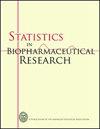Deep Neural Networks Guided Ensemble Learning for Point Estimation
IF 1.5
4区 医学
Q3 MATHEMATICAL & COMPUTATIONAL BIOLOGY
引用次数: 1
Abstract
AbstractIn modern statistics, interests shift from pursuing the uniformly minimum variance unbiased estimator to reducing mean squared error (MSE) or residual squared error. Shrinkage-based estimation and regression methods offer better prediction accuracy and improved interpretation. However, the characterization of such optimal statistics in terms of minimizing MSE remains open and challenging in many problems, for example, estimating the treatment effect in adaptive clinical trials with pre-planned modifications to design aspects based on accumulated data. From an alternative perspective, we propose a deep neural network based automatic method to construct an improved estimator from existing ones. Theoretical properties are studied to provide guidance on applicability of our estimator to seek potential improvement. Simulation studies demonstrate that the proposed method has considerable finite-sample efficiency gain compared to several common estimators. In the Adaptive COVID-19 Treatment Trial (ACTT) as a motivating example, our ensemble estimator essentially contributes to a more ethical and efficient adaptive clinical trial with fewer patients enrolled. The proposed framework can be generally applied to various statistical problems, and can serve as a reference measure to guide statistical research.Keywords: Deep learningEfficiencyImproved statisticsDisclaimerAs a service to authors and researchers we are providing this version of an accepted manuscript (AM). Copyediting, typesetting, and review of the resulting proofs will be undertaken on this manuscript before final publication of the Version of Record (VoR). During production and pre-press, errors may be discovered which could affect the content, and all legal disclaimers that apply to the journal relate to these versions also. Supplemental MaterialsSupplementary Materials including Appendices, Tables and Figures referenced in this article are available online. The R code and a help file to replicate results in the main article are available at https://github.com/tian-yu-zhan/DNN_Point_Estimation.This manuscript was supported by AbbVie Inc. AbbVie participated in the review and approval of the content. Tianyu Zhan is employed by AbbVie Inc., Haoda Fu is employed by Eli Lilly and Company, and Jian Kang is Professor in the Department of Biostatistics at the University of Michigan, Ann Arbor. Kang’s research was partially supported by NIH R01 GM124061 and R01 MH105561. All authors may own AbbVie stock.Conflict of InterestNo potential competing interest was reported by the authors.AcknowledgementsThe authors thank the editorial board and reviewers for their constructive comments.FundingThe author(s) reported there is no funding associated with the work featured in this article.深度神经网络引导集成学习的点估计
摘要在现代统计学中,人们的兴趣从追求一致最小方差无偏估计转向减小均方误差(MSE)或残差平方误差。基于收缩的估计和回归方法提供了更好的预测精度和改进的解释。然而,在最小化MSE方面,这种最优统计的特征在许多问题上仍然是开放和具有挑战性的,例如,在适应性临床试验中,根据积累的数据预先计划修改设计方面来估计治疗效果。从另一个角度来看,我们提出了一种基于深度神经网络的自动方法,从现有的估计器中构造改进的估计器。研究了理论性质,为估计方法的适用性提供指导,寻求改进的可能。仿真研究表明,与几种常用的估计方法相比,该方法具有相当大的有限样本效率增益。以适应性COVID-19治疗试验(ACTT)为例,我们的集合估计器基本上有助于以更少的患者入组进行更具道德和效率的适应性临床试验。该框架可以普遍应用于各种统计问题,并可作为指导统计研究的参考措施。关键词:深度学习效率改进统计免责声明作为对作者和研究人员的服务,我们提供此版本的已接受手稿(AM)。在最终出版版本记录(VoR)之前,将对该手稿进行编辑、排版和审查。在制作和印前,可能会发现可能影响内容的错误,所有适用于期刊的法律免责声明也与这些版本有关。补充资料补充资料包括本文中引用的附录、表格和图表均可在网上获得。主要文章中的R代码和帮助文件可在https://github.com/tian-yu-zhan/DNN_Point_Estimation.This上获得,手稿由AbbVie Inc.支持。艾伯维参与了内容的审核和批准。詹天宇就职于美国艾伯维公司,付浩达就职于美国礼来公司,康健就职于美国密歇根大学安娜堡分校生物统计学教授。Kang的研究得到了NIH R01 GM124061和R01 MH105561的部分支持。所有作者均可持有艾伯维股票。利益冲突作者未报告潜在的利益冲突。作者感谢编委会和审稿人提供的建设性意见。作者报告说,没有与本文所述工作相关的资金。
本文章由计算机程序翻译,如有差异,请以英文原文为准。
求助全文
约1分钟内获得全文
求助全文
来源期刊

Statistics in Biopharmaceutical Research
MATHEMATICAL & COMPUTATIONAL BIOLOGY-STATISTICS & PROBABILITY
CiteScore
3.90
自引率
16.70%
发文量
56
期刊介绍:
Statistics in Biopharmaceutical Research ( SBR), publishes articles that focus on the needs of researchers and applied statisticians in biopharmaceutical industries; academic biostatisticians from schools of medicine, veterinary medicine, public health, and pharmacy; statisticians and quantitative analysts working in regulatory agencies (e.g., U.S. Food and Drug Administration and its counterpart in other countries); statisticians with an interest in adopting methodology presented in this journal to their own fields; and nonstatisticians with an interest in applying statistical methods to biopharmaceutical problems.
Statistics in Biopharmaceutical Research accepts papers that discuss appropriate statistical methodology and information regarding the use of statistics in all phases of research, development, and practice in the pharmaceutical, biopharmaceutical, device, and diagnostics industries. Articles should focus on the development of novel statistical methods, novel applications of current methods, or the innovative application of statistical principles that can be used by statistical practitioners in these disciplines. Areas of application may include statistical methods for drug discovery, including papers that address issues of multiplicity, sequential trials, adaptive designs, etc.; preclinical and clinical studies; genomics and proteomics; bioassay; biomarkers and surrogate markers; models and analyses of drug history, including pharmacoeconomics, product life cycle, detection of adverse events in clinical studies, and postmarketing risk assessment; regulatory guidelines, including issues of standardization of terminology (e.g., CDISC), tolerance and specification limits related to pharmaceutical practice, and novel methods of drug approval; and detection of adverse events in clinical and toxicological studies. Tutorial articles also are welcome. Articles should include demonstrable evidence of the usefulness of this methodology (presumably by means of an application).
The Editorial Board of SBR intends to ensure that the journal continually provides important, useful, and timely information. To accomplish this, the board strives to attract outstanding articles by seeing that each submission receives a careful, thorough, and prompt review.
Authors can choose to publish gold open access in this journal.
 求助内容:
求助内容: 应助结果提醒方式:
应助结果提醒方式:


